It’s been a while since I reviewed an HP laptop, so when I first received my review unit of the 14-inch HP Spectre x360 several months ago, I was taken aback by just how gorgeous it is. It’s a stunning laptop that looks like nothing else in the market, and it offers a well-thought-out collection of features, ports, and performance.
Honestly, if it weren’t for a few minor quirks specific to my usage, it would be my perfect ultraportable laptop. Even still, it might be the laptop I would buy myself today — perhaps good enough to pry me away from Microsoft’s Surface line that which has long offered my devices of choice.
I’m not going to go in-depth into every corner of the laptop’s specs and feature set — there are plenty of other great reviews for that — but instead, highlight things that stood out during my test period.
The Good
The design
Did I mention this laptop is pretty? The angular design and shiny rose gold accents won’t be for everyone — it borders on flashy — but I absolutely love the design. It feels classy in a way that’s less generic than competition from Dell and Apple. I’m so tired of silver MacBook-esque laptops all over the place. The Spectre x360 stands out, in a good way.
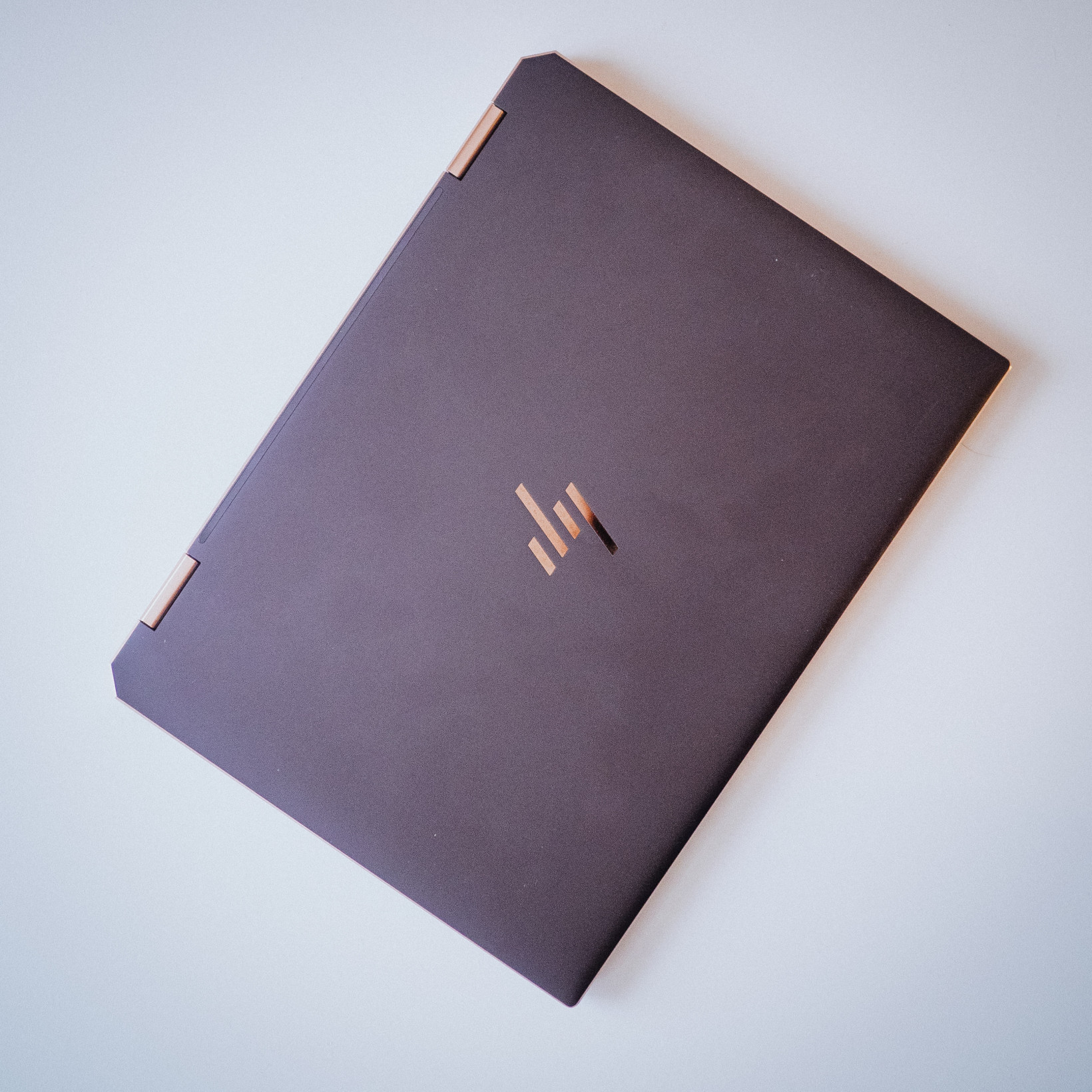

There’s also a neat blue colorway, as well as silver for the boring types.
The keyboard and trackpad
The HP Spectre x360 has a fantastic keyboard. It’s almost as good as the keyboard in the Surface Laptop — my gold standard for laptop keyboard — with no flex and a good amount of travel. Unless you like that MacBook-esque short travel, it’s also miles ahead of the keyboard on the Dell XPS 13 2-in-1, its main competitor.
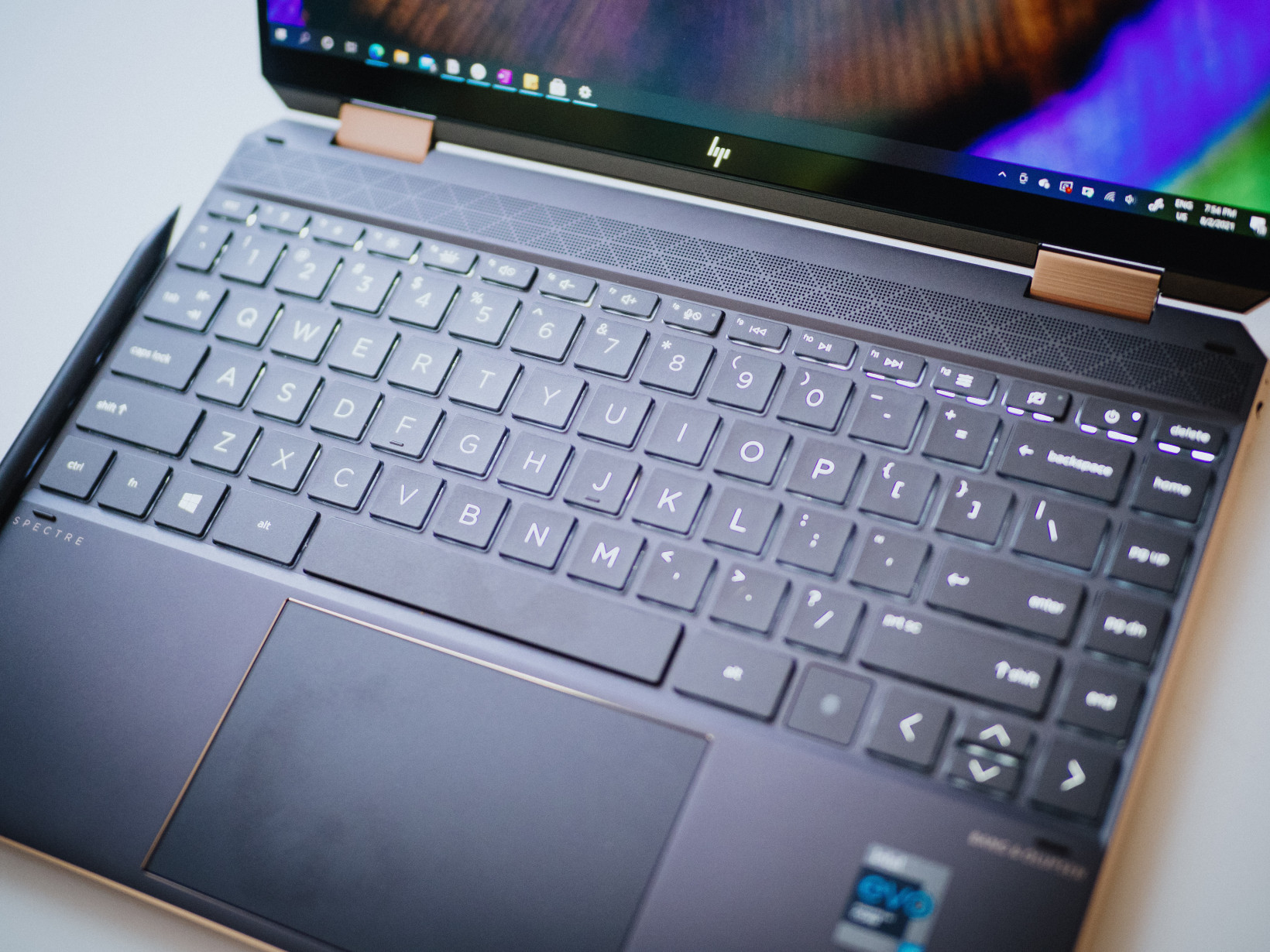

Meanwhile, the trackpad is large and uses Microsoft’s Precision drivers, and it feels just as good as any trackpad I’ve used this side of a MacBook. It has a smooth texture, it responds well to gestures, and it’s just the right size.
The display and speakers (mostly)
The Spectre x360 14 uses a 3:2 aspect ratio, which I’m a huge fan of, especially in 2-in-1 designs. The extra vertical real estate is appreciated for everything except video, and it particularly comes in handy if you often use the stylus. It’s close to the aspect ratio of your typical sheet of paper — including if you’re using side-by-side apps, as I often do when reading a book on one side of the screen and taking notes on the other.
The OLED version comes at a resolution of 3000 x 2000, which is just about perfect for this screen size. Unlike so many manufacturers that you make you choose between blurry 1080p screens and battery-murdering 4K screens, HP takes an approach more like Microsoft and Apple, giving you just enough resolution that going any sharper won’t lead to meaningful improvements, while still maintaining strong battery life. You can opt for a 1080pish display though, at (1920×1280).
The speakers are also pretty solid. Not exceptional — I find the speakers in the Surface Laptop to still be the most balance I’ve heard on a Windows laptop — but they have solid bass and decent stereo separation, with a lot of tuning options in HP’s software.
The performance
These days, for most people’s use, it’s not so much about which laptops have the fastest performance, but which ones are least likely to slow down on you. The Spectre x360 flies through all my usual tasks, including having a bazillion tabs open, editing photos in Lightroom and Photoshop, and running a few large instrument libraries in my music software.
The Core i7 11th Gen intel processor I tested is available on most of its main competition, but I find it’s a step up from the previous generation in terms of minimizing throttling, and I felt the Spectra x360’s cooling meant it rarely slowed down when burdened with multiple apps. I do wish HP allowed you to configure the laptop with 32GB of RAM though. My unit came with the maximum of 16GB, and while that should be enough for most people, it would be nice to have a little more future-proofing.
The battery life
The Spectre x360 doesn’t offer exceptional battery life in its OLED version, but it’s still better than usual for a laptop with this display technology and pixel density. It should have no trouble getting you through a workday if most of what you do involves a browser, and you can always opt for the lower resolution LCD panel should you need extra battery life. On average, I got somewhere between 5-8 hours, which I consider good for my relatively heavy use and typical high brightness.
The extras
These days, you’ll usually only get a couple of USB-C ports on a 2-in-1 laptop this thin. The spectre x360 is one of the few to offer a third port — a USB-A one — and having used it alongside Dell’s XPS 13 2-in-1, I was very often grateful that I didn’t need to go find a dongle for various USB-A accessories. Both USB-C ports are Thunderbolt 4 enabled too.
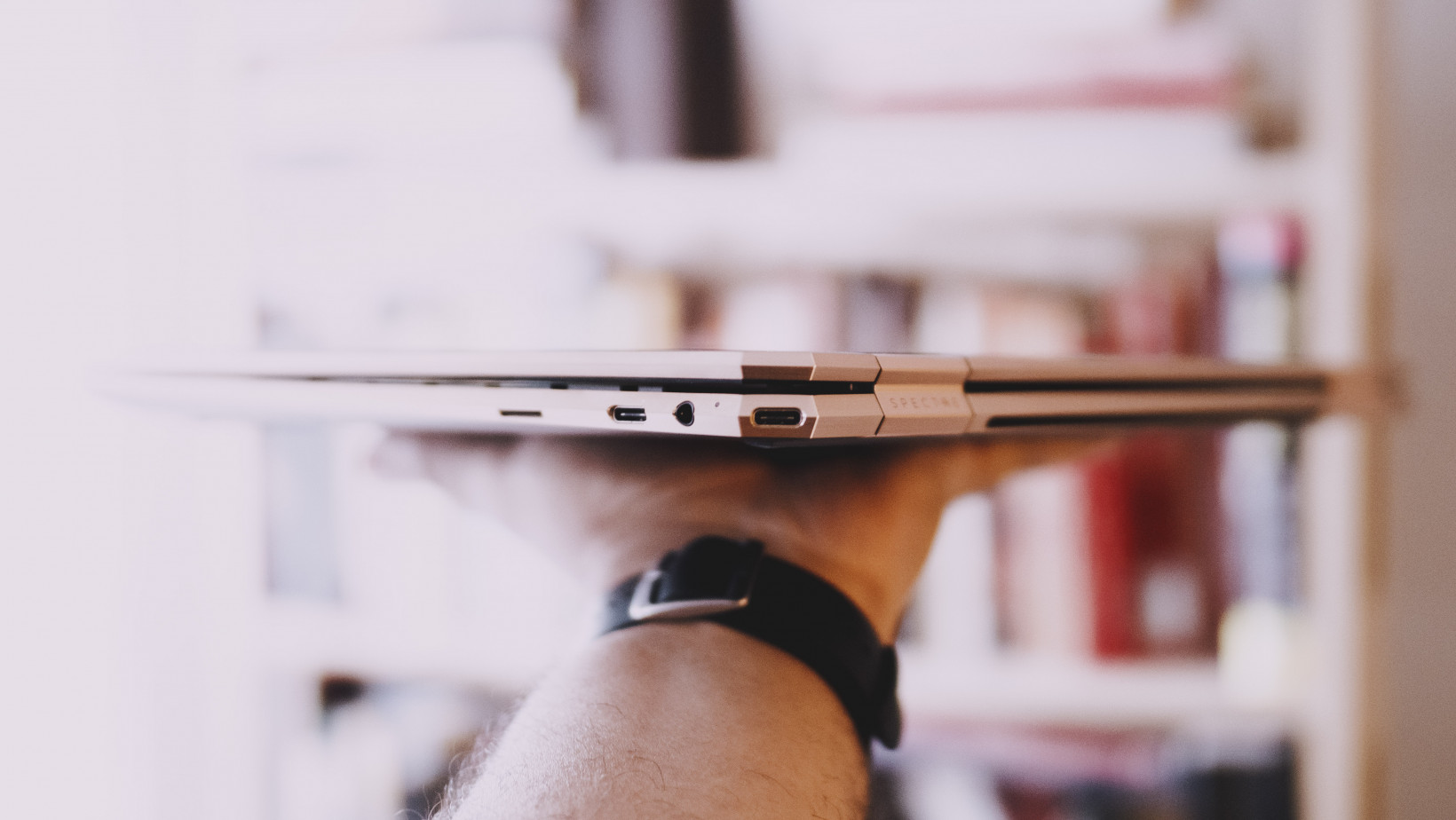

There are a few other nice touches:
- You get both Windows Hello facial recognition and a fingerprint reader for biometric security — the latter is appreciated if you’re working with a mask on.
- You have a MicroSD card slot to expand storage easily.
- There’s is a button that will both kill your webcam in software and cover it with a tiny little cover. ensuring no one can spy on you.
- There’s also a microphone mute button.
- There’s a keyboard shortcut for the HP Command Center, where you have a good degree of control over power profiles, including a preview of CPU temperature and fan speeds.
- An N-Trig stylus is included, and it mercifully charges quickly via USB-C
The price
Starting at $1,150, it’s priced very reasonably too. That base spec includes an 11th Gen Intel Core i5, 8GB of RAM, and 256GB of storage, and a 1920 x 1280 display. That should honestly be more than enough for the average PC user. My review model came with the Core i7 processor, the OLED display, 1TB of storage, and 16GB of RAM, which currently yield a $1680 price in HP’s configurator. The only upgrade I think is really significant is opting for 16GB of RAM, and upgrading from 256GB of storage to 512 is only 30 bucks extra, so might as well do it for future-proofing. This configuration costs $1,310.
The nitpicky stuff
The OLED quirks
OLED is cool. The pitch-black darkness is amazing when watching videos in low light. But the OLED panel in the Spectre x360 14 isn’t as good as we’ve come to expect from the OLED screens in the phones of 2021.
For one, the display is grainy when displaying solid colors, and it’s particularly visible with white backgrounds. It’s already noticeable when using the device as a laptop, but becomes even more apparent when you’re using it as a tablet where your face will typically be closer to the screen.
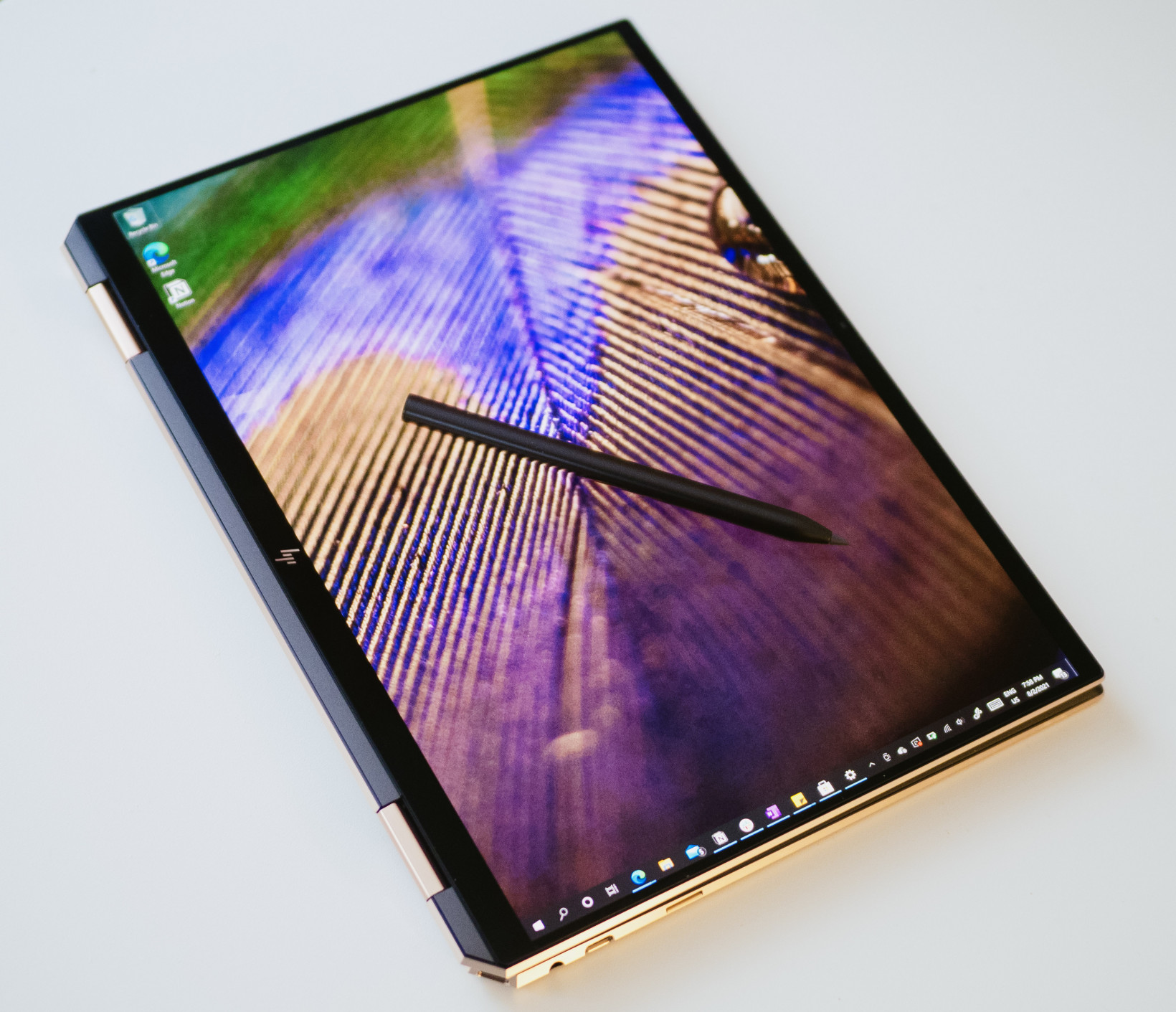

For another, edges around text can be a little fuzzy with greenish-purple hues. These are both very subtle effects, but if you’re the type of person who noticed these things with the OLED phones of yesteryear, you’re sure to notice it here.
The Spectre x360 shines in videos and photos, somewhat ironically it’s when doing basic stuff like reading text and writing documents that I prefer a good old IPS panel. I think I prefer having an OLED to an LCD panel of similar resolution, but just barely.
The stylus input
I’m one of those weirdos that actually use the stylus all the time. I’ve been a Surface user for years, so I use the stylus to take a ton of handwritten notes, write out equations, do selections in Photoshop, etc. My PC is quite literally my notebook, replacing pen and paper for me years ago.
Coming from a Surface Book 3, the handwriting experience on the Spectre x360 feels a generation or so behind. This was surprising as HP actually uses the same N-trig technology as Microsoft — indeed my Surface Pen worked just fine on the Spectre — but the pen input feels a little less sensitive than on Microsoft’s devices.
It’s hard to describe as the effect is subtle, but it feels like my handwriting gets smoothed out a little too much by the display. I have small handwriting, and smaller characters sometimes just get smoothed out into a straight line; I found myself having to write larger to compensate. It doesn’t seem to be something about HP’s included stylus either; I had the same issue with the Surface Pen. It’s either something about the display or the drivers.
It should be noted I am really nitpicking here. It matters to me because stylus handrwiting is a primary method of using my PC. I don’t notice it when using the stylus to edit images in Adobe Lightroom or sketch stuff in Photoshop. But if you’re expecting Surface or iPad-level stylus support, the Spectre x360 isn’t quite there yet.
Also, the magnet that holds the stylus to the laptop is a little wimpy.
The straight-up bad stuff
The webcam
The webcam will make you look like you’ve been kidnapped by a flip phone enthusiast. Here’s a photo from said webcam:


It’s barely useable. Maybe it wouldn’t be such a big deal in the days where talking via webcam was just an occasional frivolity for most people, but in an age where video calls have become a part of everyday life, the camera on the x360 doesn’t cut it. While the resolution is technically stated at 720p, the lens and/or sensor don’t seem to be resolving much more than 360p.
Of course, the camera quality is a compromise to fit the thin upper bezel, but it needs to be noted nonetheless. It’s really bad.
That’s it.
At this price, there’s very little to complain about the Spectre x360. There are some minor inconveniences that most people can live with, and the rest of the laptop is a stunning package with a welcome design and collection of features.
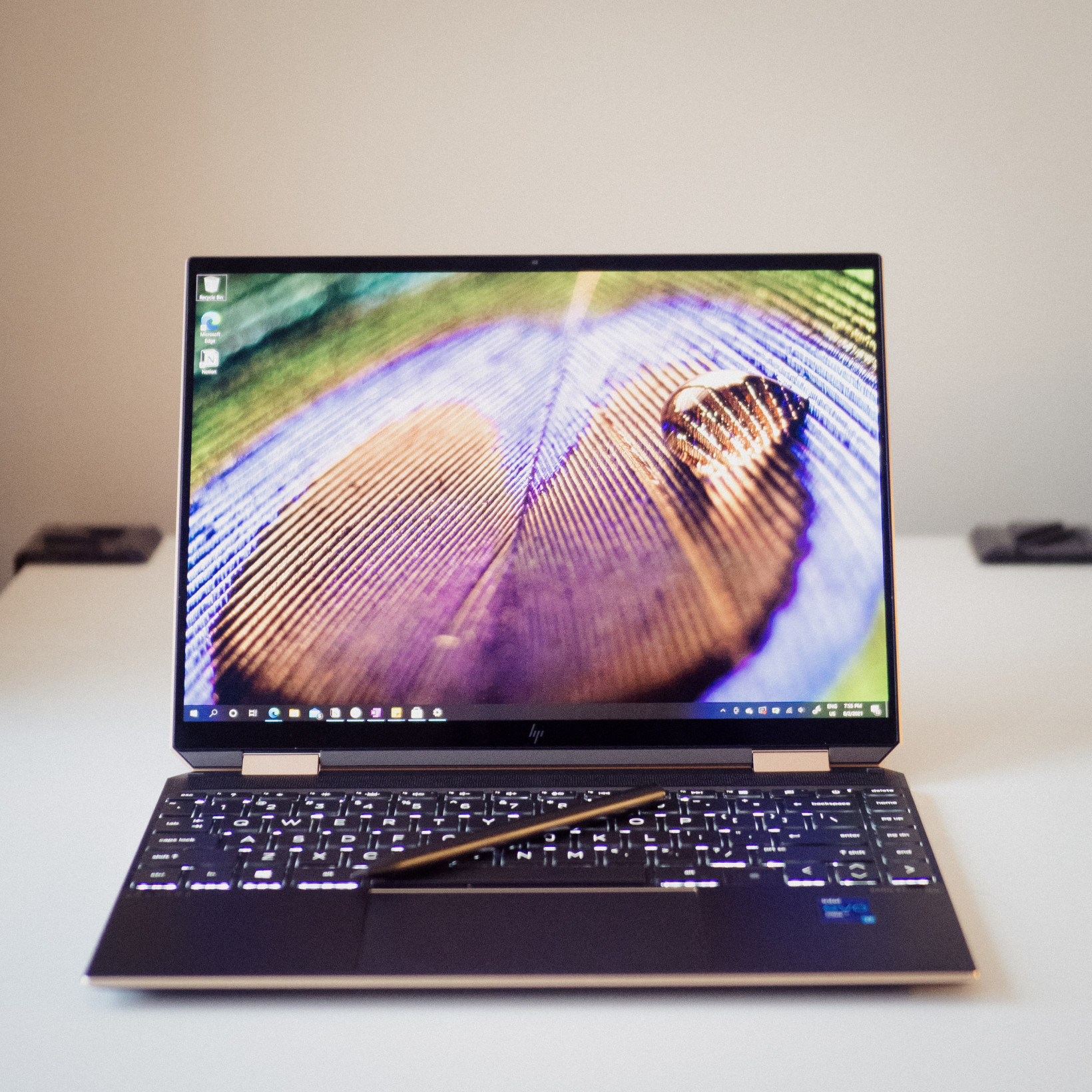

It may just be the best Windows laptop you can right now under 15 inches. Dell’s XPS 13-2-in-1 is very similar performance and price-wise, but I prefer the display, design, and keyboard on the HP. Microsoft’s Surface Laptop 4 offers an equally good design and better battery life per resolution, but it doesn’t turn into a tablet and it offers fewer ports.
The Spectre x360 is one of the most versatile, well-thought-out Windows laptops out there. Starting at $1,150, it’s an easy-peasy recommendation. HP gets almost everything right.
Did you know we have a newsletter all about consumer tech? It’s called Plugged In – and you can subscribe to it right here.